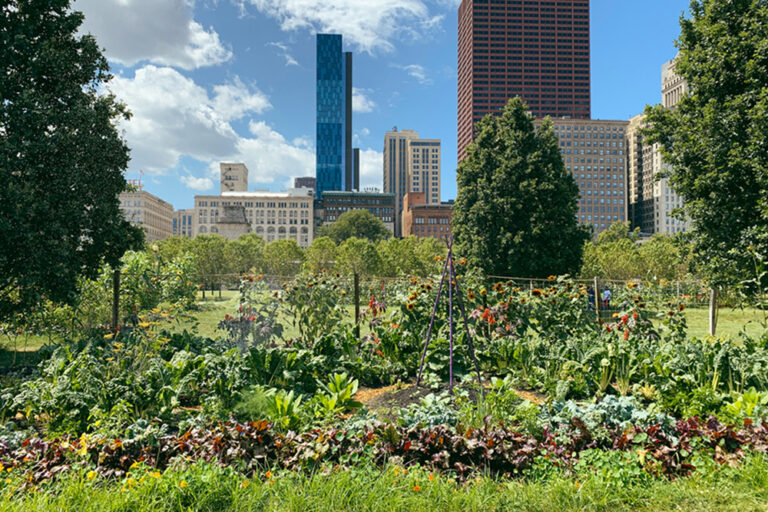5 Cities on the Grow: Urban Farms Worth Celebrating
Think you have to leave the city to have access to fresh, farm-grown food? Think again.

Want to support the hyper-local food movement and get your groceries from your own backyard? You might not think it’s possible living in a big city, but these innovative programs are bringing urban farming to a neighborhood near you.
All it takes is a seed of inspiration to grow a revolution. Urban farms do just that — provide local, fresh foods — for cities where there’s more cement than soil. Take a look at what these five cities are doing to cultivate success.
In This Article
Toledo, Ohio
Innovation: Aquaponic Farm + Pan-Asian Restaurant
Two University of Toledo grads wanted to bring something novel to the area. Their answer? Create an urban farm and restaurant. Balance Pan-Asian Grille sources menu items from Balance’s Vertical Urban Aquaponics Farm. Tucked in the Toledo skyline, the aquaponic farm produces fresh, local greens all year long — kale, cilantro, peppers, pea pods, microgreens and more. Fish create nutrients for the plants, and the plants create fresh water for the fish.
Balance’s aquaponic urban farm also supplies dozens of local restaurants with locally-grown, organic produce. Many cities have urban farms, restaurants, and unique growing processes. Balance combines all these ideas. Their success has brought three additional Ohio locations in Sylvania, Perrysburg and Cleveland.
Other Toledo urban farm programs that deserve two “green” thumbs-up:
Grace Community Center in Toledo installed a 10,000-square-foot raised garden bed in 2017. Since then, the center’s gardens have evolved into a place for education, employment, and a Youth Entrepreneurship Program. Another program, Toledo GROWs, serves more than 125 gardens in schools, neighborhoods, and other Toledo-area organizations.
Orlando, Florida
Innovation: Urban Farm Bicycling
Helpful honeybees swarm to pollinate and grow plants. Well, Orlando has their own swarm of beneficial bees at work — The Swarm, a group of biking urban farmers. The non–profit group Fleet Farming hosts bi-weekly Swarm Rides. Workers and volunteers bike to area homes to set up mini-urban farms. Then, from planting to education, they bring gardening to the people.
Fleet Farming has unique programs like “Creating a Pet Garden” so Orlando growers can learn to grow safe, healthy plants for their furry friends. Making farming fun and accessible is part of the program. Urban farming for dogs? That’s innovation.
Other Orlando urban farm programs that deserve two “green” thumbs-up:
Infinite Zion Farms grows fresh food in a former food desert — collard greens, papayas, lettuce and bananas. Another urban farm welcomes all at the Orange County Convention Center. With Center-to-Table Gardens, the convention center is the largest LEED (Leadership in Energy and Environmental Design) certified convention center in the world.
Seattle, Washington
Innovation: City Park Transformation
There’s no city park quite like the Rainier Beach Urban Farm & Wetlands in Seattle. This city park’s 10-acre urban farm is located on the ancestral lands of the Duwamish people. With acres of gardens, several greenhouses and even an area for wetland protection (which may support a future rice bog), it’s a dream urban farm. The farm has two free U-pick areas and a CSA (community-supported agriculture) for the community. Gardening and cooking classes are offered, with monthly community kitchen dinners. Raising chickens and ducks, plus beekeeping, round out this ambitious project.
Other Seattle urban farm programs that deserve two “green” thumbs-up:
P-Patch are public gardens that educate and supply Seattle food banks with organic produce. These garden patches total 89 throughout Seattle to nourish, feed and preserve heirloom varieties of herbs and vegetables.
Camden, New Jersey
Innovation: Teen Entrepreneurship
Urban farming is hot here — just ask the teens that developed KAPOW! hot sauce. Eco Interns learn urban farming, cooking and entrepreneurship. Participants learn everything from growing hot peppers to creating the perfect recipe for their popular KAPOW! sauce. From field to farmer’s market, these teen urban farmers learn lessons on teamwork, leadership, finances and respect for the land.
Camden’s Center for Environmental Transformation (CFET) also manages a half-acre of gardens. CFET’s orchard is filled with plums, gooseberries, Asian pears and hazelnuts. Beehives also produce Midas Touch Honey. Additionally, CFET hosts immersion retreats. Hands-on urban farm retreats last 2-7 days with on-site overnight accommodations. Many university students and groups come from all over to lend a hand while learning about environmental solutions through urban farming.
Other Camden urban farm programs that deserve two “green” thumbs-up:
Invincible City is an urban farm and an online supermarket. The urban farm/grocery business packages and delivers healthy foods from local farmers with no minimum order totals. These innovators are taking on convenience marts with convenient online orders and delivery at prices people can actually afford.
Baltimore, Maryland
Innovation: Little Urban Farmers
With a 100% kid-run farmer’s market, these 2nd through 5th graders in Baltimore are getting their start young. Baltimore Urban Gardening with Students (BUGS) gets small hands into fresh soil with their own veggie and flower gardens. Children also have access to an on-site greenhouse, egg-laying hens, a kitchen, classrooms and the last remaining wetlands on Baltimore’s Inner Harbor.
Raising urban farmers is only part of the equation. BUGS kids have a safe, fun place to explore after school and during the summer. With access to academic help, these kids also delve into cooking/nutrition, gardening, STEM and creative arts.
Other Baltimore urban farm programs that deserve two “green” thumbs-up:
TreeBaltimore adds some much-needed green to the city; planting trees — including local fruit trees — improves Baltimore’s air quality and manages storm-water runoff. Baltimore Orchard Project is another beautifying and tasty project. The Genesee Pear Orchard produces Master Gardeners and crisp, nutritious pears for all.
